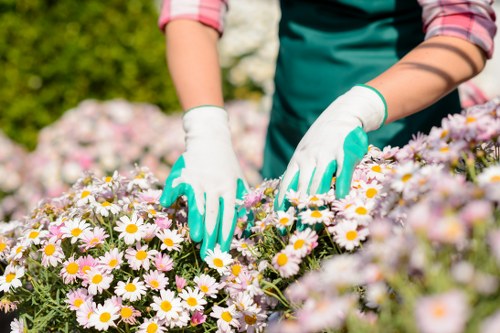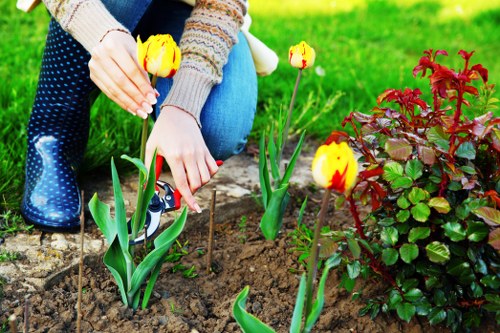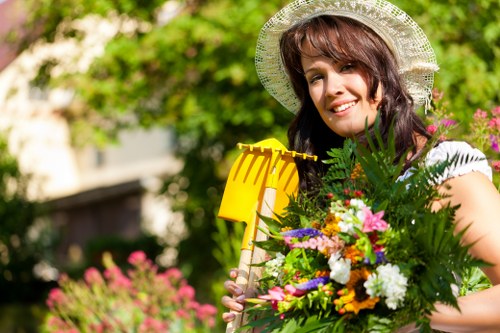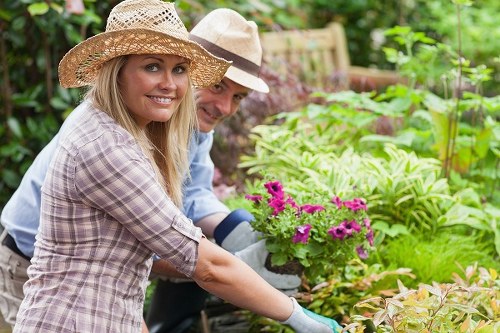Garden Maintenance in Tufnell Park
Why Regular Garden Maintenance Matters

Maintaining a beautiful garden in Tufnell Park isn’t just about aesthetics; it plays a crucial role in enhancing the overall value of your property. A well-kept garden provides a serene environment, promotes biodiversity, and contributes to the local ecosystem.
Regular garden maintenance ensures that your plants remain healthy and vibrant throughout the year. It involves a series of tasks such as weeding, pruning, mowing, and fertilizing, which collectively keep your garden in optimal condition.
Neglecting garden maintenance can lead to overgrown plants, pest infestations, and the deterioration of garden structures. This not only diminishes the beauty of your outdoor space but can also result in costly repairs and replacements in the long run.
Seasonal Garden Care

Each season brings its own set of challenges and opportunities for garden maintenance. Understanding the specific needs of your garden throughout the year is essential for sustained beauty and health.
Spring Maintenance
Spring is the perfect time to prepare your garden for the growing season. Start by clearing away any debris that accumulated over the winter months. This includes fallen leaves, dead branches, and any other unwanted materials.
Planting new flowers and vegetables can add color and variety to your garden. Additionally, it's important to start a regular watering and fertilizing schedule to support the new growth.
Summer Maintenance
During the summer, focus on keeping your garden well-watered and weed-free. Mulching can help retain moisture in the soil and suppress weed growth. Regular mowing and trimming are also necessary to maintain a neat appearance.
Watch out for pests and diseases, as the warm weather can promote their spread. Implementing natural pest control methods can help protect your plants without harming the environment.
Lawn Care Tips

A lush, green lawn is the centerpiece of any garden. Proper lawn care involves regular mowing, watering, and fertilizing to ensure healthy grass growth.
Mowing Techniques
Ensure that your mower blades are sharp to make clean cuts, which promote healthier grass. Avoid cutting the grass too short, as this can stress the plants and make them more susceptible to weeds and pests.
It's also beneficial to alternate your mowing pattern each time you cut the lawn. This prevents soil compaction and encourages upright growth.
Watering Strategies
Watering your lawn deeply but infrequently encourages deep root growth, which makes your grass more drought-resistant. Early morning is the best time to water, reducing evaporation and allowing the grass to dry before nightfall.
Using a rain gauge can help you monitor rainfall and adjust your watering schedule accordingly, ensuring your lawn receives the right amount of moisture.
Pruning and Trimming Techniques

Pruning and trimming are essential practices for maintaining the shape and health of your plants. Proper techniques can prevent diseases, encourage growth, and enhance the overall appearance of your garden.
When to Prune
The timing of pruning depends on the type of plants you have. Generally, late winter or early spring is ideal for most shrubs and trees, while summer is better suited for flowering plants.
Regular pruning helps remove dead or diseased branches, allowing more sunlight and air to reach the healthy parts of the plant.
Tools and Safety
Using the right tools is crucial for effective pruning. Invest in high-quality shears, pruners, and saws to make clean cuts without damaging the plants.
Always wear protective gear such as gloves and safety glasses to prevent injuries while pruning.
Choosing the Right Plants for Tufnell Park

Selecting plants that thrive in the Tufnell Park climate is key to a successful garden. Consider factors such as soil type, sunlight exposure, and local climate conditions when choosing your plants.
Native Plants
Native plants are well-adapted to the local environment, making them more resilient and easier to maintain. They also support local wildlife, including birds and beneficial insects.
Examples of native plants suitable for Tufnell Park gardens include lavender, rosemary, and various types of ferns.
Seasonal Bloomers
Incorporating plants that bloom in different seasons ensures that your garden remains colorful throughout the year. Spring bulbs, summer annuals, autumn perennials, and winter evergreens can create a dynamic and vibrant landscape.
- Spring: Tulips, daffodils, and hyacinths.
- Summer: Roses, sunflowers, and marigolds.
- Autumn: Chrysanthemums, asters, and sedums.
- Winter: Holly, camellias, and ornamental grasses.
Integrated Pest Management
[H5]Maintaining a healthy garden requires effective pest management strategies. Integrated Pest Management (IPM) combines biological, cultural, and chemical practices to control pests with minimal environmental impact.
Biological Controls
Encouraging natural predators such as ladybugs, birds, and beneficial insects can help keep pest populations in check. Planting nectar-rich flowers can attract these predators to your garden.
Cultural Practices
Proper garden hygiene, such as removing dead plant material and rotating crops, can prevent the buildup of pests and diseases. Additionally, selecting pest-resistant plant varieties reduces the risk of infestations.
Chemical Controls
When necessary, use chemical treatments as a last resort. Opt for environmentally friendly options and follow the manufacturer's instructions to minimize harm to beneficial organisms and the surrounding ecosystem.
Maintaining Garden Structures
Garden structures like fences, sheds, and patios add functionality and charm to your outdoor space. Regular maintenance ensures they remain safe and attractive.
Fence Maintenance
Inspect fences for loose boards, rust, or signs of wear. Repair or replace damaged sections to maintain the structural integrity and appearance of your garden fences.
Shed Care
Keep sheds clean and dry to prevent mold and deterioration. Regularly check for leaks and ensure doors and windows are functioning properly.
Mulching and Soil Health
Mulching is a vital practice that enhances soil health, retains moisture, and suppresses weeds. Selecting the right type of mulch can significantly impact the success of your garden maintenance efforts.
Types of Mulch
Organic mulches such as bark, straw, and compost gradually decompose, enriching the soil with nutrients. Inorganic mulches like gravel and rubber provide longer-lasting coverage without adding nutrients.
Choose mulch based on your garden's specific needs and the types of plants you are cultivating.
Soil Amendments
Regularly testing and amending your soil ensures it remains fertile and well-draining. Adding compost, manure, or other organic matter can improve soil structure and provide essential nutrients for plant growth.
Proper soil management is the foundation of a thriving garden, supporting healthy plant development and resilience against pests and diseases.
Watering Systems and Irrigation
Efficient watering practices are essential for maintaining a healthy garden, especially during the hotter months. Implementing the right watering systems can save time and resources while ensuring your plants receive adequate moisture.
Drip Irrigation
Drip irrigation delivers water directly to the base of each plant, reducing evaporation and minimizing water waste. It's an ideal solution for gardens with multiple beds and diverse plantings.
Rainwater Harvesting
Collecting rainwater is an eco-friendly way to water your garden. Installing rain barrels or other collection systems can provide a sustainable water source for your plants.
- Reduce your water bill by utilizing natural rainfall.
- Promote environmentally responsible gardening practices.
- Ensure a consistent water supply during dry periods.
By combining these systems, you can create a reliable and efficient watering strategy tailored to your garden's unique requirements.
Garden Lighting and Aesthetics
Proper lighting can transform your garden, highlighting key features and creating a magical atmosphere during the evenings. It enhances safety while adding aesthetic appeal to your outdoor space.
Types of Garden Lighting
There are various types of garden lighting to consider, including:
- Path Lights: Illuminate walkways and pathways, ensuring safe navigation around your garden at night.
- Spotlights: Highlight specific garden features such as trees, sculptures, or water features.
- String Lights: Add a festive and cozy ambiance, perfect for outdoor gatherings and relaxing evenings.
Energy-Efficient Options
Opt for energy-efficient lighting solutions like LED bulbs or solar-powered lights. These options reduce energy consumption and minimize your garden's environmental footprint.
Incorporating dimmers and timers can further enhance energy savings by allowing you to control the intensity and duration of the lighting.
Pest and Disease Prevention
Preventing pests and diseases is a critical aspect of garden maintenance. Implementing proactive measures can safeguard your plants and reduce the need for extensive treatments.
Healthy Plant Practices
Start with healthy plants by sourcing them from reputable nurseries. Avoid overwatering and ensure proper spacing to promote air circulation, which helps prevent fungal infections and other diseases.
Regular Inspections
Conduct regular inspections of your plants to identify early signs of pests or diseases. Prompt action can prevent the spread and minimize damage to your garden.
Use natural remedies and biological controls as the first line of defense before considering chemical treatments.
Encouraging Beneficial Insects
Introduce or attract beneficial insects like bees, butterflies, and predatory beetles that help control pest populations naturally.
Companion Planting
Companion planting involves growing compatible plants together to enhance growth and deter pests. For example, planting marigolds alongside vegetables can repel harmful insects.
Composting and Waste Management
Composting is an eco-friendly practice that recycles garden waste into valuable organic matter. It reduces landfill contributions and enriches your soil with essential nutrients.
Setting Up a Compost Bin
Choose a suitable location for your compost bin, ensuring it receives adequate airflow and moisture. Layer green materials like vegetable scraps and grass clippings with brown materials such as dried leaves and straw.
Maintaining Your Compost
Regularly turn your compost to aerate it and promote decomposition. Keep the compost moist but not waterlogged to facilitate the breakdown of organic matter.
After several months, your compost will be ready to use as a natural fertilizer, enhancing the soil quality and promoting healthy plant growth.
Benefits of Composting
- Reduces garden waste and landfill burden.
- Improves soil structure and fertility.
- Enhances water retention and drainage in the soil.
Using Compost in Your Garden
Incorporate compost into your garden beds by mixing it with the existing soil. This practice provides a nutrient-rich foundation for your plants, supporting robust growth and resilience.
Hiring Professional Garden Maintenance Services
While DIY garden maintenance is feasible, hiring professional services can offer expertise and save you time. Professionals possess the knowledge and tools to handle complex tasks efficiently.
Benefits of Professional Services
Outsourcing garden maintenance ensures that your garden receives consistent and high-quality care. Professionals can identify and address issues that may not be apparent to the untrained eye, such as subtle pest infestations or soil deficiencies.
- Expertise: Access to specialized knowledge and techniques.
- Time-Saving: Free up your schedule by delegating maintenance tasks.
- Equipment: Utilize professional-grade tools and machinery.
Choosing the Right Service Provider
When selecting a garden maintenance service in Tufnell Park, consider factors such as experience, reputation, and the range of services offered. Reading reviews and seeking recommendations can help you find a reliable provider.
Ensure that the service aligns with your specific needs and garden requirements to achieve the best results.
Customized Maintenance Plans
A reputable service provider will offer tailored maintenance plans based on your garden's unique characteristics and your personal preferences. This personalized approach ensures that your garden receives the attention it deserves.
Contact Us Today
Ready to transform your garden in Tufnell Park? Contact us today to schedule a consultation and discover how our expert maintenance services can bring your outdoor space to life.
Sustainable Gardening Practices
Embracing sustainable gardening practices not only benefits the environment but also enhances the longevity and health of your garden. Implementing eco-friendly techniques can lead to a more resilient and self-sustaining outdoor space.
Water Conservation
Adopt water-saving methods such as drip irrigation, rainwater harvesting, and mulching to reduce water usage. Selecting drought-tolerant plants can further minimize the need for frequent watering.
Organic Gardening
Utilize organic fertilizers and pest control methods to maintain soil health without introducing harmful chemicals into the ecosystem. Composting, as previously mentioned, plays a significant role in organic gardening.
- Benefits: Promotes a healthier environment and safer plants.
- Techniques: Crop rotation, green manure, and companion planting.
- Outcomes: Improved soil fertility and reduced pest issues.
Reducing Waste
Minimize garden waste by recycling plant clippings, using biodegradable materials, and repurposing old containers for new plantings. This approach reduces your garden's carbon footprint and fosters a culture of sustainability.
Energy-Efficient Tools
Choose energy-efficient gardening tools and equipment to lower your energy consumption. Electric or solar-powered tools are preferable over gas-powered alternatives, contributing to a greener garden.
Enhancing Garden Biodiversity
A diverse garden supports a wide range of wildlife, promoting a balanced and healthy ecosystem. Encouraging biodiversity can lead to natural pest control and a more vibrant garden environment.
Plant Variety
Incorporate a mix of plant species, including flowering plants, shrubs, trees, and ground covers. This variety provides habitats and food sources for different insects, birds, and other beneficial creatures.
Wildlife-Friendly Features
Install features such as birdhouses, insect hôtels, and water sources to attract and support local wildlife. Creating a welcoming environment encourages the presence of pollinators and natural pest predators.
Benefits of Biodiversity
- Pest Control: Natural predators help manage pest populations.
- Pollination: A variety of flowers attracts pollinators essential for plant reproduction.
- Resilience: Diverse gardens are more resilient to diseases and environmental changes.
Plant Health and Diversity
A biodiverse garden is less susceptible to widespread disease outbreaks, as the presence of multiple species can interrupt the transmission pathways of pathogens. This natural balance fosters a healthier and more sustainable garden.
Creating Functional Outdoor Spaces
Your garden can serve as an extension of your living space, providing areas for relaxation, entertainment, and recreation. Designing functional outdoor spaces enhances the usability and enjoyment of your garden.
Seating Areas
Incorporate comfortable seating arrangements such as benches, loungers, or outdoor sofas. These areas provide a place to unwind and enjoy the beauty of your garden.
Outdoor Kitchens and Dining
Setting up an outdoor kitchen or dining area allows you to host gatherings and enjoy meals al fresco. Equip the space with necessary amenities like grills, counters, and lighting to create a functional and inviting environment.
- Grills and Cooktops: Essential for outdoor cooking.
- Dining Furniture: Durable and weather-resistant options are ideal.
- Lighting: Ensure adequate illumination for evening use.
Recreational Features
Add features like play areas for children, garden ponds, or fire pits to enhance the functionality of your outdoor space. These elements can provide entertainment and relaxation options for you and your family.
Privacy Enhancements
Use hedges, trellises, or garden screens to create private zones within your garden. These additions offer secluded areas for personal reflection and reduce noise pollution from the surrounding environment.
Conclusion
Effective garden maintenance in Tufnell Park requires a combination of regular care, strategic planning, and sustainable practices. By understanding the unique needs of your garden and implementing the right techniques, you can create a thriving and beautiful outdoor space.
Whether you choose to maintain your garden yourself or hire professional services, prioritizing garden maintenance will ensure that your Tufnell Park garden remains a source of pride and enjoyment for years to come.
Book your service now to experience the benefits of a professionally maintained garden tailored to your specific needs.

